Text João Barbosa | Translation Jani Dunne
The wine growing history in Monte da Ravasqueira goes far back. Work on the vine started in 1998. The first plantation happened in 2000, and the first vintage to go on the market was in 2002, released in 2003 with Fonte Serrana. However, this property in Arraiolos county has been there for a long time, despite the close family ties between the current owners and the contemporary history of Portugal.
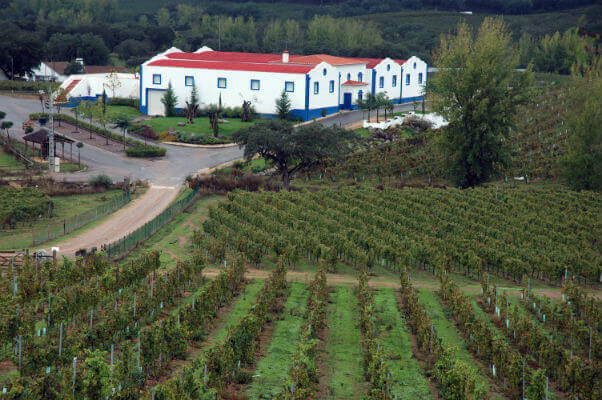
Monte da Ravasqueira – Photo by Monte da Ravasqueira | All Rights Reserved
The land used to belong to Dom Nuno Álvares Pereira, a Portuguese constable and strategist, who lead Dom João (future João 1st of Portugal) and his party to victory in the succession war against Dom João 1st, King of Castile and León, between 1383 and 1385. The land was handed over along with the title of Count of Arraiolos, nowadays belonging to Dom Duarte Pio de Bragança (25th owner), the 24th Duque of Bragança, and heir to the Portuguese Crown.
However, with time, Herdade da Ravasqueira has seen different owners and boundaries. In this story, it’s most important to look at history from 1943 onwards, when it was inherited by the Mello family, who owned a business emporium at the time, created by Alfredo da Silva with Companhia União Fabril.
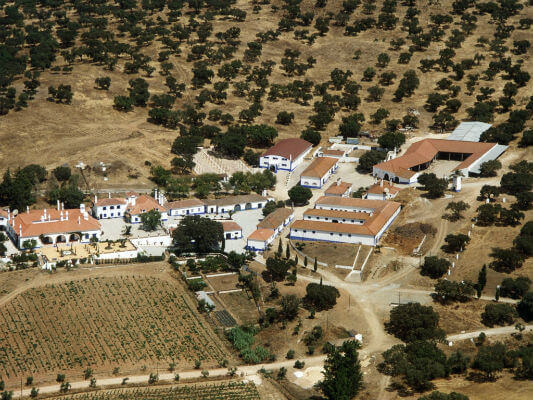
Herdade da Ravasqueira – Photo by Monte da Ravasqueira | All Rights Reserved
The revolution on the 25th April 1974 obviously caused upheavals. Politics tended towards the left wing, especially the Portuguese Communist Party; the Mellos went into exile, and their property was nationalised. Herdade da Ravasqueira was occupied by workers in a process known as Land Reform.
With the return of political stability, and when Portugal was included in the East-European family of democracies, the Mellos were able to return and newly take up their place as business leaders in the country. In addition, this land in Alentejo was handed back to its previous owners in 1980, but is practically decrepit due to abandonment and negligence.
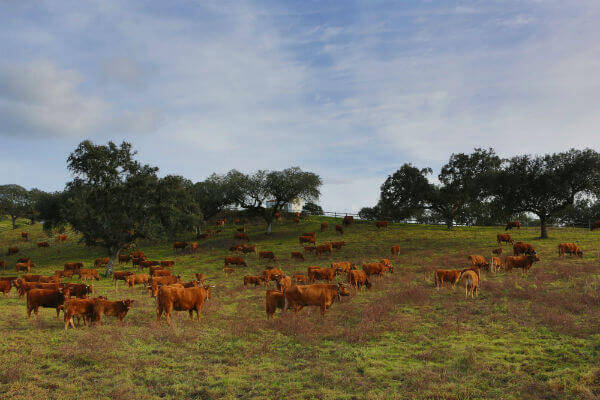
Cattle – Photo by Monte da Ravasqueira | All Rights Reserved
Herdade da Ravasqueira has about 7413 acres, about 3700 of which are forested. Cattle count goes up to 500 heads of bovine, a cross of mertolengo with limusine. The olive trees also take up a small parcel. The biggest activity is wine, with 111 acres of vines split into 29 plots.
This Alentejo area is on a slope, which allows for different shades according to the different heights. At the same time, the soil is very variable, with ten different formations, and clay-calcareous soil being dominant, although the vine is located in areas with outcropping of granite and schist.
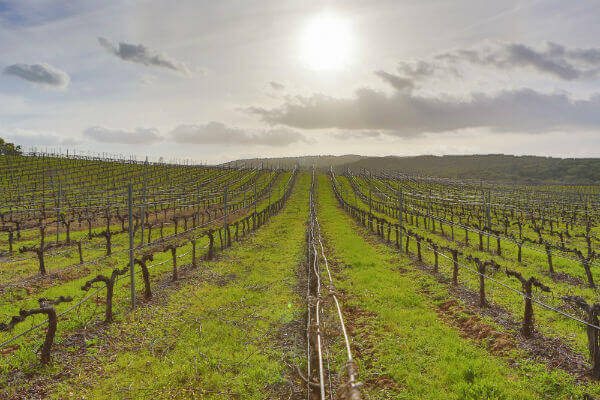
The Vines – Photo by Monte da Ravasqueira | All Rights Reserved
The degree of clay is somewhere between 20 and 30%, according to Pedro Pereira Gonçalves, the director for wine growing and oenology. The soil composition allows for water retention deep down, which causes some water stress, in turn forcing hard work on the plants. If necessary, a drop-by-drop watering system is available. “It’s better if the vine asks us for water rather than having us water it.” – says the expert.
Pedro Pereira Gonçalves has been working for this producer since 2012. Although young, he already has a good resume and a reputation. They have been betting on freshness, harvesting the fruit earlier than the rest of Alentejo. This way, they can make nectars of high alcohol levels, which are rare today – although the trend tends to go that way.
“Ravasqueira has a lot of bodies of water, and it’s in a valley, so you obtain more freshness”, notes Pedro Pereira Gonçalves. Well, the alcohol level in the whites was raised up to a surprising 11.5%, sometimes reaching 12.5%. In the reds, the scale goes from 13% to 13.5%.
One of the decisions of this young oenologist was – still a rare thing in Portugal – to have a photographer shoot the land while on a plane using different spectral bands. “It enabled the harvest, which was performed plot by plot, to be performed by area.” – says the expert.
Thanks to this additional insight, it’s been possible to coordinate the wines with the desired profiles. Precision agriculture “allows us to make the wine on the vine”. Since Pedro Pereira Gonçalves arrived, the number of proposals from a higher end of the range has raised, namely reserves and monovarietals. Diversity makes a production of seven monovarietal wines possible: Alvarinho, Nero D’Avola, Petit Verdot, Sangiovese, Sauvignon Blanc, Touriga Franca and Viognier. Next year, they will be releasing a sparkling wine.
The Alvarinho variety originates in Northwest Portugal, where the climate is cooler. If mishaps in Vinho Verde region can sometimes generate orange juice (fortunately, it doesn’t always happen), in hot Alentejo, they sometimes melt into sweets – a little heavy, and thus nauseating. There is nothing more unusual than what’s produced at Monte da Ravasqueira, where the variety was planted in a more airy and cooler area.
Monte da Ravasqueira Alvarinho 2013 includes notes of tangerine, it’s mineral and elegant, revealing a potential for ageing in the bottle. If you close your eyes and allow yourself to dream a little, it will even whisper the word Chablis… mind you, it’s but a gentle suggestion.
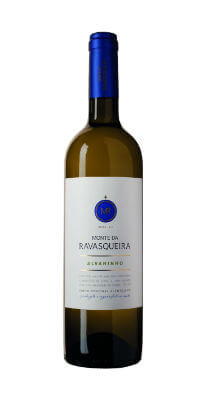
Monte da Ravasqueira Alvarinho – Photo by Monte da Ravasqueira | All Rights Reserved
Monte da Ravasqueira Reserva White 2013 was made with Alvarinho (40%) and Viognier (60%); it’s slippery, so… be careful. This wine has good texture in the mouth, and aromas of lime and peach.
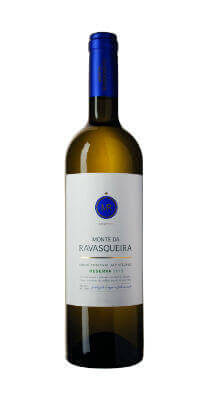
Monte da Ravasqueira Reserva White – Photo by Monte da Ravasqueira | All Rights Reserved
MR Premium White was made in honour of the father of the current generation of Grupo Mello owners, José Manuel de Mello. According to the oenologist, this wine isn’t consensual, “but it wasn’t meant to be either”. It’s a repository of all the honoured person’s favourite varieties: Alvarinho, Aringo, Marsanne, Semillon and Viognier. In the 2013 edition, Pedro Pereira Gonçalves chose a more New Zealand-like approach: to close the wines inside casks for one year. Notes of vanilla, rich tea biscuits, white chocolate and plum notes emerged. Very elegant, and once again, slippery.
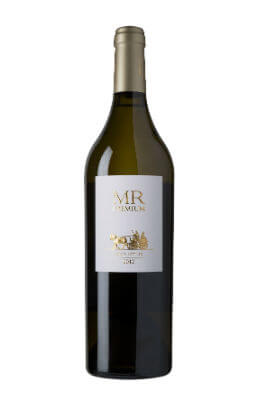
MR Premium White – Photo by Monte da Ravasqueira | All Rights Reserved
Monte da Ravasqueira Rosé 2014 was made from Touriga Nacional grapes, harvested early from the many plots it was planted in. It’s refreshing, and although the variety offers violets in the Dão region, here it reveals a bouquet of roses instead. It’s a pretend-sweet wine. A very interesting rosé.
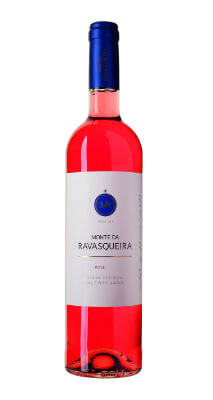
Monte da Ravasqueira Rosé – Photo by Monte da Ravasqueira | All Rights Reserved
Monte da Ravasqueira Vinha das Romãs (Pommegranate Vine) is, as you can tell by the name, a product of a particular spot, where Syrah and Touriga Nacional varieties occur. In the 2012 edition, the French variety provided 70% of the grapes. It’s a very dry wine, albeit not austere. It promises to endure in the bottle.
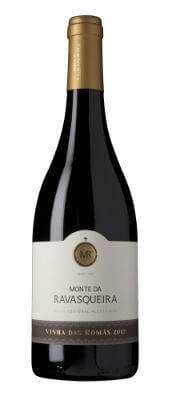
Monte da Ravasqueira Vinha das Romãs – Photo by Monte da Ravasqueira | All Rights Reserved
MR Premium Red 2012, as a result of the variety of cultivars, is very rich and complex in what comes to aromas, which follow one-another, then match, split, make up, single or accompanied by the same partner. It shows a notable dash of nature in Alentejo – which I am a fan of – and it’s holly oak timber. In the mouth, it’s also a pretend sweet. It has the speed and bite of a roadster. I think it could also develop well in the bottle.
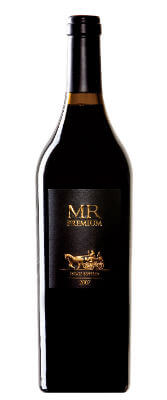
MR Premium Red 2012 – Photo by Monte da Ravasqueira | All Rights Reserved
Monte da Ravasqueira Touriga Franca 2012, to a fan of the variety – me –, is an itch. On a whim, I would forbid planting it outside Douro. I think that, after all the trips they made, few are able to achieve the charisma of that Northwestern Portuguese region. This doesn’t mean the quality isn’t there, it’s only an intellectual pet peeve.
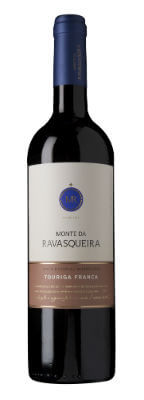
Monte da Ravasqueira Touriga Franca – Photo by Monte da Ravasqueira | All Rights Reserved
In Ravasqueira, Touriga Franca proved to be an Alentejo variety in the 2012, with aromas of stubble and the oak and holly oak groves. It’s dry in the nose and the mouth reveals minerality, while also evoking chalk. It has fantastic tannins, it’s racing and elegant, let’s say it has the temper of a nobleman when in his rural property. Now, it needs decanting with some violence, or to be opened in advance. And it will last for years. I can see it’s a beautiful Touriga Franca!
Monte da Ravasqueira Syrah and Viognier (2012), 3% of which is the white variety, is a refreshing and lively wine, which evolves well in the glass and is quite interesting. I tasted it after the previous wine. It’s beautiful, although still a child comparing to the big boy. I would use the idiomatic expression “azar dos Távoras” (meaning the bad luck of the Távoras family when they were chased by the first marquis of Pombal, who ruled the country in the 18th Century, and ordered for almost the entire family’s arrest and murder).
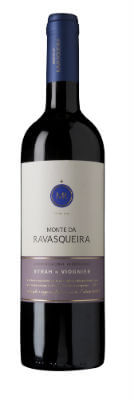
Monte da Ravasqueira Syrah and Viognier – Photo by Monte da Ravasqueira | All Rights Reserved
Summing up: freshness, and an unusual disarray of profiles, pretend-sweetness (good!), complexity and a promise of longevity.
Contacts
Monte da Ravasqueira
7040-121 ARRAIOLOS
Tel: (+351) 266 490 200
Fax: (+351) 266 490 219
E-mail: ravasqueira@ravasqueira.com
Website: www.ravasqueira.com




Leave a Reply